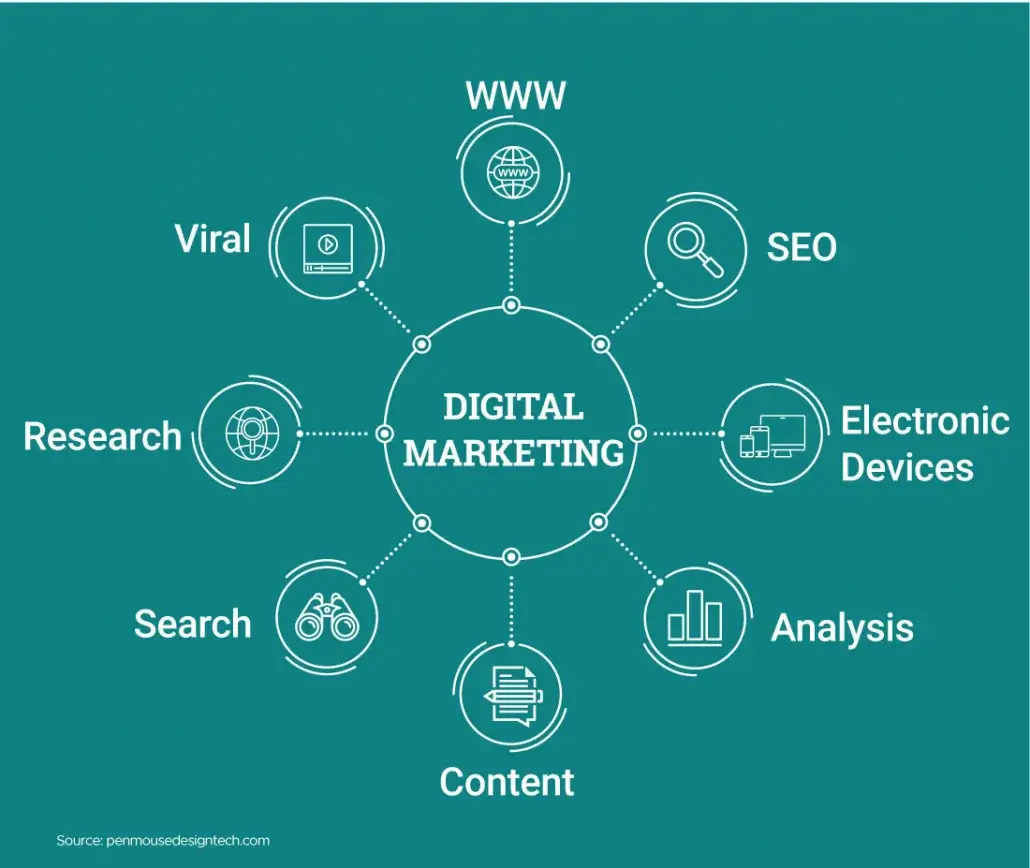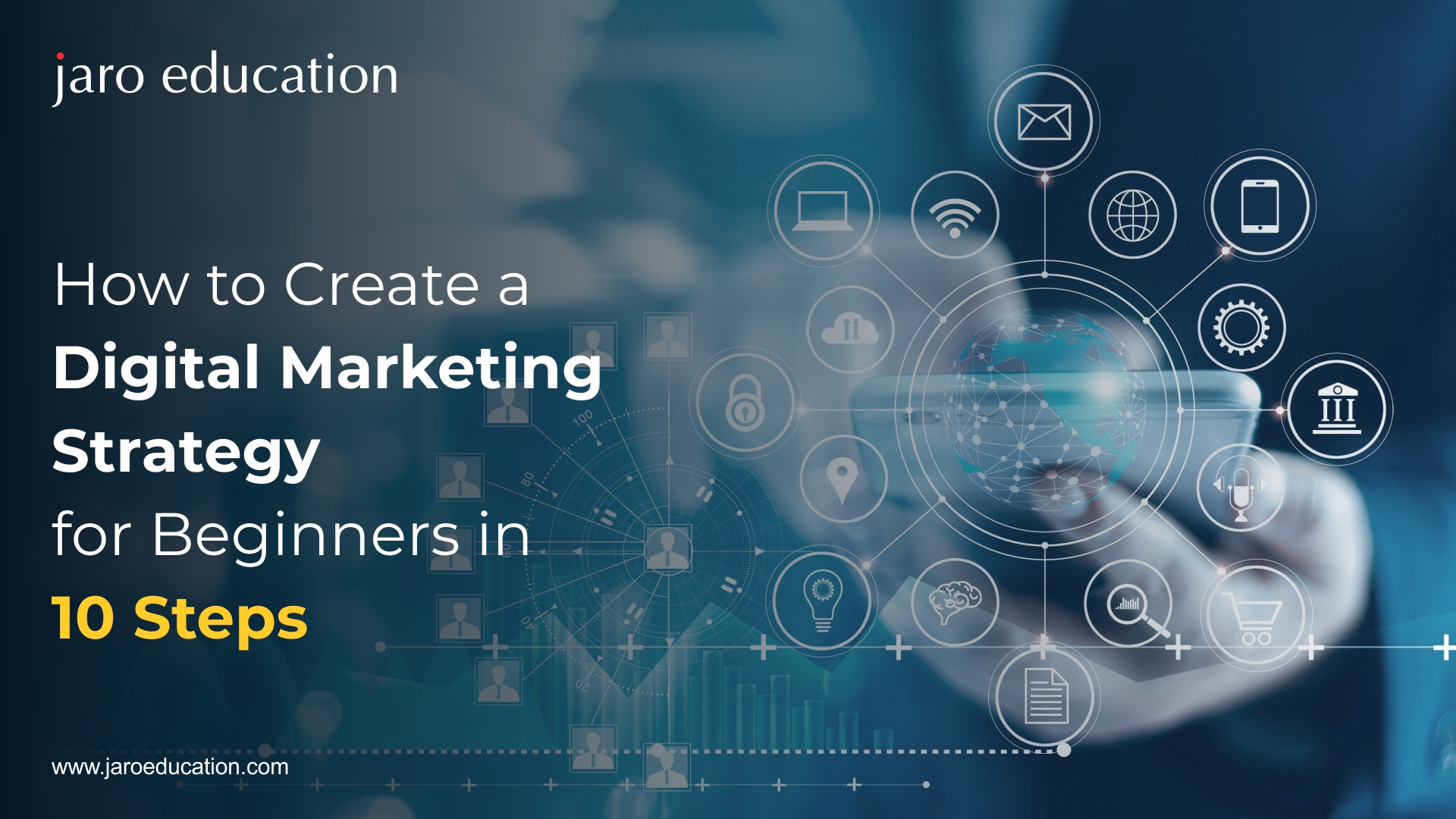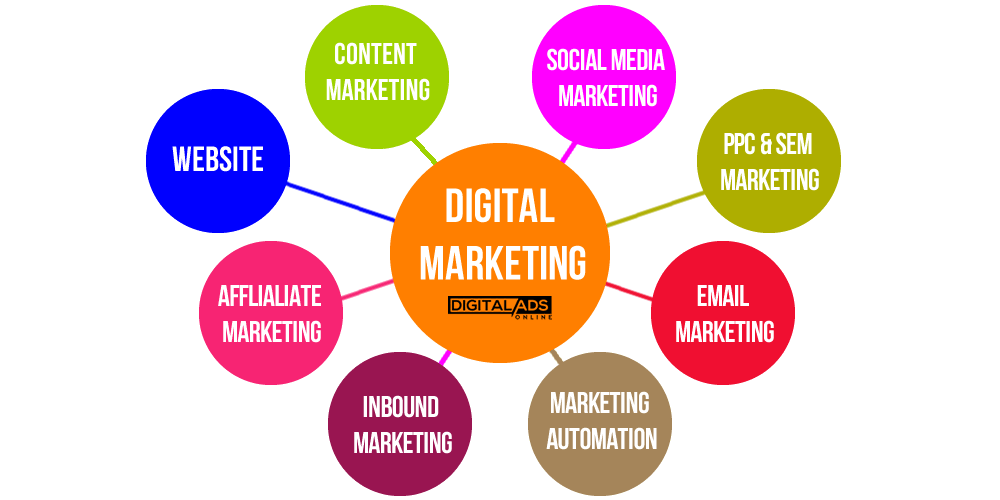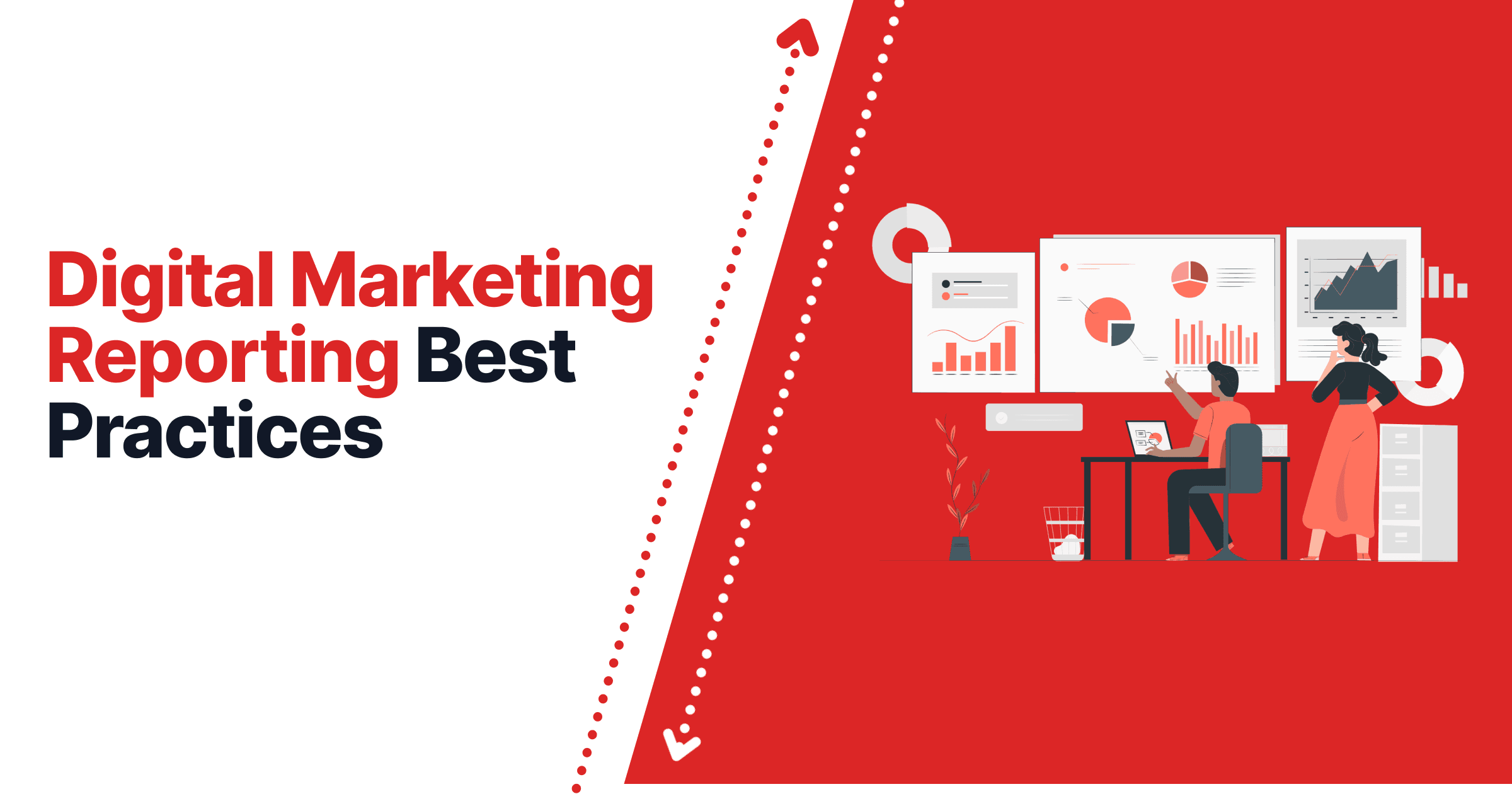What is Digital Marketing? (A Beginner’s Guide)

1. Introduction
- Simple explanation of how marketing has shifted online.
- Why digital marketing is essential in today’s world.
- A relatable example of digital marketing in daily life.
2. What is Digital Marketing?
- Clear, beginner-friendly definition of digital marketing.
- Difference between traditional and digital marketing with simple examples.
- Overview of how digital marketing connects businesses to their audience online.
3. How Does Digital Marketing Work?
- Explanation of audience targeting and segmentation.
- Overview of how brands use digital channels to engage customers.
- The role of technology and analytics in tracking results.
4. Key Types of Digital Marketing (Beginner’s Perspective)
- Search Engine Optimization (SEO): Making websites visible on Google.
- Social Media Marketing: Promoting businesses on platforms like Instagram and Facebook.
- Content Marketing: Sharing blogs, videos, or images to inform and engage.
- Email Marketing: Sending newsletters or updates to customers.
- Pay-Per-Click (PPC) Advertising: Running paid ads on search engines or social media.
- Affiliate Marketing: Collaborating with partners to promote products.
- Influencer Marketing: Partnering with social media influencers to reach new audiences.
5. Benefits of Digital Marketing for Beginners
- Cost-effective for small businesses or startups.
- Ability to start small and scale up campaigns.
- Access to a global audience from day one.
- Instant feedback and measurable results through tools like Google Analytics.
6. Getting Started with Digital Marketing
- Tips for beginners:
- Choose a platform where your audience is active.
- Start with a simple strategy (e.g., social media posts or email campaigns).
- Use free tools like Canva, Mailchimp, or Google Analytics.
- Importance of learning basic SEO and social media marketing.
7. Challenges Beginners May Face
- Overwhelming number of tools and platforms.
- Learning how to analyze data and optimize strategies.
- Staying updated with trends and algorithm changes.
8. Why Digital Marketing is the Future
- Increasing reliance on online platforms for shopping, communication, and information.
- Advancements in AI, automation, and personalization.
- Opportunities for businesses of all sizes to grow online.
9. Conclusion
- Recap of what digital marketing is and why beginners should embrace it.
- Encouragement to start small and experiment with strategies.
- Call-to-action to explore digital marketing tools or enroll in a beginner course.
Digital Marketing Strategies for Beginners

1. Introduction
- Overview of why digital marketing is essential for businesses today.
- Importance of having a clear strategy, especially for beginners.
- A simple statistic or example to highlight the impact of digital marketing strategies.
2. What is a Digital Marketing Strategy?
- Definition of a digital marketing strategy in simple terms.
- How it helps businesses achieve goals through online channels.
- Difference between random efforts and a planned strategy.
3. Key Digital Marketing Strategies for Beginners
Define Your Target Audience:
- Importance of knowing your audience (age, interests, behaviors).
- Tools to understand audience demographics (Google Analytics, social media insights).
Set Clear Goals:
- Examples of beginner-friendly goals (increase website traffic, gain followers, generate leads).
- Importance of SMART goals (Specific, Measurable, Achievable, Relevant, Time-bound).
Optimize Your Website for SEO:
- Basics of search engine optimization (keywords, meta descriptions, mobile-friendly design).
- Importance of ranking on search engines like Google.
Leverage Social Media Marketing:
- Choosing the right platform based on your audience (e.g., Instagram for visuals, LinkedIn for professionals).
- Tips for consistent posting and engaging content.
Start with Content Marketing:
- Creating valuable content like blogs, videos, or infographics.
- How content builds trust and authority.
Run Email Marketing Campaigns:
- Benefits of building an email list early.
- Tips for writing effective, beginner-friendly email campaigns.
Use Paid Advertising Wisely:
- Introduction to Pay-Per-Click (PPC) ads for beginners.
- How to start small with Google Ads or social media ads.
Analyze and Improve:
- Importance of tracking results with tools like Google Analytics or Facebook Insights.
- Learning from data to improve future campaigns.
4. Tips for Beginners to Succeed with Digital Marketing Strategies
- Start with one or two strategies to avoid overwhelm.
- Experiment and adapt as you learn.
- Utilize free tools and resources (Canva, HubSpot Academy, Mailchimp).
- Stay consistent and patient—it takes time to see results.
5. Common Mistakes Beginners Should Avoid
- Trying to do everything at once.
- Ignoring data and analytics.
- Not optimizing content for mobile users.
- Overlooking the importance of audience research.
6. The Future of Digital Marketing Strategies
- Trends beginners should be aware of: AI, video marketing, and voice search.
- Importance of continuous learning and staying updated.
7. Conclusion
- Recap of key strategies that beginners should focus on.
- Encouragement to start with small, achievable goals.
- Call-to-action to implement these strategies and refine them over time.
Lorem ipsum dolor sit amet, consectetur adipiscing elit. Ut elit tellus, luctus nec ullamcorper mattis, pulvinar dapibus leo.
"Importance of digital marketing"

1. Introduction
- Brief explanation of how technology has changed marketing.
- Why businesses need digital marketing in today’s online-driven world.
- A compelling statistic or trend to highlight the growing impact of digital marketing.
2. What is Digital Marketing?
- Short definition of digital marketing.
- Comparison between traditional and digital marketing.
- Examples of digital marketing channels (e.g., social media, email, SEO).
3. Why is Digital Marketing Important?
Global Reach:
- Ability to connect with audiences worldwide.
- Examples of small businesses reaching international customers.
Cost-Effectiveness:
- Lower cost compared to traditional marketing like TV ads or billboards.
- Flexibility to start small and scale up campaigns.
Targeted Advertising:
- Tools like Google Ads and Facebook Ads for precise audience targeting.
- Examples of demographic targeting (age, interests, location).
Measurable Results:
- Use of analytics tools to track campaign performance.
- Examples of metrics (clicks, conversions, ROI).
Increased Engagement:
- Direct interaction with customers through social media, comments, and live chats.
- Importance of building relationships with the audience.
Level Playing Field:
- How small businesses can compete with larger brands using digital marketing.
- Success stories of startups gaining visibility through online strategies.
Real-Time Adaptability:
- Ability to tweak campaigns based on performance and trends.
- Examples of how brands respond to customer feedback instantly.
Enhanced Personalization:
- Delivering tailored messages and offers to individual customers.
- Role of AI and data-driven marketing in creating personalized experiences.
4. Importance of Digital Marketing for Different Sectors
- Small Businesses: Affordable way to build brand awareness.
- E-commerce: Driving online sales through targeted campaigns.
- Nonprofits: Reaching donors and raising awareness for causes.
- Local Businesses: Attracting customers with local SEO and online reviews.
5. Challenges in Digital Marketing
- Competition and content saturation.
- Rapidly changing algorithms and technologies.
- Importance of staying updated and agile.
6. Future of Digital Marketing
- Role of AI, machine learning, and automation in improving campaigns.
- Emerging trends like voice search, AR/VR, and conversational marketing.
- Increased emphasis on data privacy and ethical marketing practices.
7. Conclusion
- Recap of why digital marketing is essential in today’s world.
- Encouragement for businesses to embrace digital strategies to stay competitive.
- Call-to-action for readers to explore and adopt digital marketing for their growth.
"Digital marketing for beginners"

1. Introduction
- Brief explanation of what digital marketing is.
- Why digital marketing is important for businesses and individuals.
- Overview of what beginners can learn and apply from this article.
2. What is Digital Marketing?
- Clear definition of digital marketing.
- Difference between digital and traditional marketing.
- Examples of digital marketing in action (e.g., social media ads, email newsletters).
3. Why Should Beginners Learn Digital Marketing?
- Growing demand for digital marketing skills in the job market.
- Opportunities for small businesses and entrepreneurs to grow their brands.
- Flexibility to start small and scale efforts as needed.
4. Key Areas of Digital Marketing for Beginners
Search Engine Optimization (SEO):
- Introduction to optimizing content for search engines.
- Simple tips for beginners, such as using keywords and creating quality content.
Social Media Marketing:
- Overview of popular platforms like Instagram, Facebook, and LinkedIn.
- Tips for posting engaging content and building a following.
Content Marketing:
- Importance of creating valuable blogs, videos, and graphics.
- How content marketing helps attract and retain audiences.
Email Marketing:
- Basics of building an email list.
- Tips for crafting simple and effective email campaigns.
Pay-Per-Click (PPC) Advertising:
- Introduction to running ads on Google and social media platforms.
- Tips for starting with a small budget.
Analytics and Performance Tracking:
- Explanation of why data is important.
- Introduction to beginner-friendly tools like Google Analytics and social media insights.
5. How to Get Started with Digital Marketing
- Step 1: Learn the basics using free or affordable resources (e.g., blogs, videos, online courses).
- Step 2: Experiment with creating content on a blog or social media account.
- Step 3: Use free tools like Canva, Mailchimp, and HubSpot to practice.
- Step 4: Focus on one platform or strategy at a time to avoid overwhelm.
- Step 5: Track results and learn from performance data.
6. Common Challenges for Beginners
- Overwhelmed by the number of tools and platforms.
- Difficulty in understanding analytics and interpreting data.
- Staying consistent with posting and campaigns.
- Adapting to fast-changing trends and algorithms.
7. Tips for Success in Digital Marketing
- Start small and build your skills gradually.
- Stay consistent with your efforts.
- Follow successful brands for inspiration.
- Keep learning through online courses, blogs, and industry updates.
8. Benefits of Learning Digital Marketing
- Open doors to career opportunities in a growing industry.
- Build a personal brand or grow a business online.
- Ability to work from anywhere as a freelancer or entrepreneur.
9. Conclusion
- Recap the importance of digital marketing for beginners.
- Encouragement to take the first steps and experiment with simple strategies.
- Call-to-action to explore more tools, resources, and beginner-friendly tutorials.
Best Practices in Digital Marketing

1. Introduction
- Overview of the importance of digital marketing in today’s business landscape.
- Why following best practices is crucial for success.
- Brief mention of what readers will learn in the article.
2. What Are Digital Marketing Best Practices?
- Definition of best practices in digital marketing.
- The role of strategy, consistency, and adaptability in digital campaigns.
- Examples of how following best practices can lead to success.
3. Key Best Practices in Digital Marketing
Understand Your Audience:
- Importance of audience research (demographics, preferences, behaviors).
- Tools to identify and analyze your target audience (Google Analytics, social media insights).
Set Clear Goals:
- Use SMART goals (Specific, Measurable, Achievable, Relevant, Time-bound).
- Examples of common goals (e.g., increased website traffic, better conversion rates).
Develop a Content Strategy:
- Importance of creating valuable, relevant, and engaging content.
- Consistency in posting and aligning content with audience interests.
Optimize for Search Engines (SEO):
- Focus on keyword research, on-page optimization, and backlinks.
- Importance of mobile optimization and fast loading times.
Leverage Social Media Effectively:
- Choose the right platforms based on your target audience.
- Engage with your audience through comments, polls, and live sessions.
Utilize Data and Analytics:
- Track performance metrics like website traffic, conversion rates, and engagement.
- Use tools like Google Analytics, Facebook Insights, and HubSpot.
Personalize User Experiences:
- Tailor content, ads, and email campaigns to individual preferences.
- Examples of how personalization improves engagement and conversions.
Adopt a Mobile-First Approach:
- Ensure websites and content are optimized for mobile devices.
- Importance of responsive design and mobile-friendly ads.
Invest in Paid Advertising:
- Best practices for running PPC campaigns on Google and social media platforms.
- Tips for managing budgets and tracking ROI.
Stay Updated with Trends and Technology:
- Importance of keeping up with emerging tools and platforms.
- Examples: AI, voice search, and video marketing.
4. Common Mistakes to Avoid in Digital Marketing
- Overlooking audience research.
- Ignoring the importance of analytics and performance tracking.
- Using outdated strategies or ignoring trends.
- Posting inconsistent or irrelevant content.
5. Benefits of Following Best Practices
- Improved campaign performance and ROI.
- Stronger relationships with customers through targeted communication.
- Better adaptability to changing market trends.
6. Conclusion
- Recap the importance of adhering to digital marketing best practices.
- Encourage readers to start implementing these strategies step by step.
- Call-to-action to explore tools, resources, or professional guidance to excel in digital marketing.
